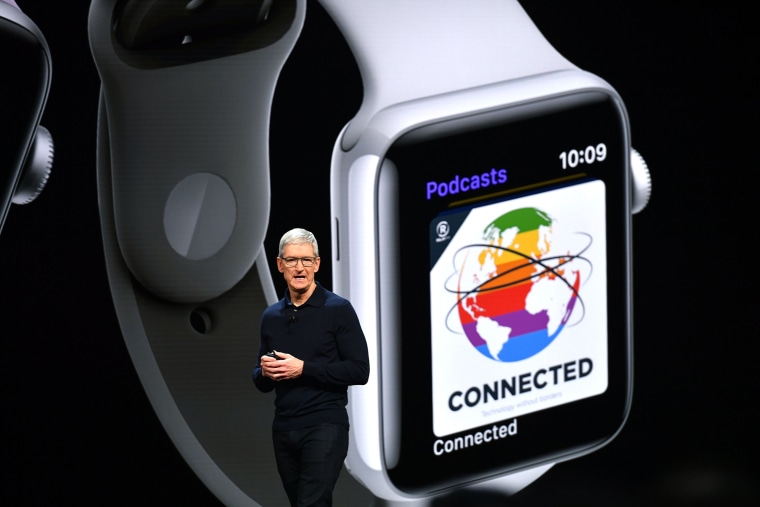SAN JOSE, Calif. — Apple is declaring war on internet tracking technology while also taking steps to address smartphone addiction.
The tech giant announced on Monday that its latest software update will stop other companies from collecting user data and bombarding users with the same advertisement wherever they go online.
The macOS Mojave software update, which will be available to users this fall, will get rid of like, share and comment widgets on popular websites — some of the mechanisms that are used to track users through a process called “fingerprinting.”
“When you browse the web, your device can be identified by a unique set of characteristics like its configuration, fonts you have installed and plug-ins on the device,” Craig Federighi, senior vice president of software engineering at Apple, said onstage at Apple’s annual developer conference. “Data companies can use this to construct a unique fingerprint and track you from site to site.”
Apple is calling this expanded approach to privacy “intelligent tracking prevention.” When the free Mac update launches this fall, Federighi said that “your Mac will look like everyone else’s Mac” to the companies using these tactics.
The update comes at a time when Apple’s Silicon Valley neighbor, Facebook, continues to weather criticism over the permissions it granted to app developers at the expense of user privacy. However, Apple’s tracker prevention announcement will likely have little impact for Facebook users, who overwhelmingly browse the social network using the app, not the Safari browser, which is receiving the software update.
“Google and Facebook have many ways of tracking users as they move from site to site,” Patrick Moorhead, principal analyst at Moor Insights & Strategy, a tech industry advisory firm, told NBC News. “As Google and Facebook rely on these kinds of technologies to build profiles and serve the right kinds of ads, I think the companies will find other ways to do this.”
“But it is a good move by Apple, and I think puts more teeth behind their privacy stance,” Moorhead said.
Apple will also increase data protections, requiring apps to get permission before they are able to use a computer’s camera and microphone or access someone’s mail history and database of messages, Federighi said.
“Apple is taking privacy seriously and putting control in the hands of end users to decide whether they are OK with site-to-site data tracking," Ojas Rege, chief strategy officer at mobile software company MobileIron, said. "This will make it more difficult for service providers to build a customer profile without explicit consent from the end user and put pressure on other browser providers as well to deploy a stricter privacy model.”
The company’s annual developer conference, which runs through June 8, comes as Silicon Valley faces intense scrutiny from privacy advocates and regulators over its products and its privacy practices. While Apple is generally considered to be ahead of the curve on privacy, there have been calls for the company to address the addictive properties of modern smartphones and the apps they feature.
The iPhone — and smartphones in general — have become necessary, even mandatory, for many people, largely thanks to their ever-increasing functions and seemingly endless array of apps. But the relentless alerts and the “fear of missing out” on social networks can make smartphones feel addictive — and leave people feeling down.
Apple’s next software update for the iPhone, which will be released this fall, includes a suite of tools that try to make the iPhone less addictive without sacrificing any of its functionality.
The days of app notifications flooding the iPhone home screen will soon come to an end. Apple will instead group notifications together, cutting back on home-screen clutter and the need to keep looking at your iPhone every time there’s a shiny new alert.
But perhaps the greatest indicator of a person’s digital health will be measured in a dashboard that will let users monitor how much time they spend in apps and how often they glance at their phones. For people who find themselves being sucked into a black hole by certain apps, Apple will let them set controls that will trigger reminders when time is almost up for the day.
Apple also hopes to help people get a better night’s sleep with a “do not disturb” mode that will completely turn notifications off for the night, saving those late night messages for the morning.
Siri is also getting a big upgrade in iOS 12 in an effort to make the smart assistant faster. One feature will give apps quick access to Siri, letting users set shortcuts. Throughout the day, Siri can offer suggestions, such as ordering a coffee through an app in the morning. Or, if Siri senses a person is at the movies, it can suggest putting his or her iPhone on “do not disturb” mode.
Of course, it wouldn’t be an Apple event without all the bells and whistles thrown into the mix.
In this case, a “Measure” app coming to iOS 12 uses augmented reality to let users measure physical objects, making a physical tape measure ancient history.
Apple is also ushering in a new era of emoji — called memoji. With the upcoming software update, people will be able to design emoji that reflect their appearance, finally bringing emoji representation to everyone.
